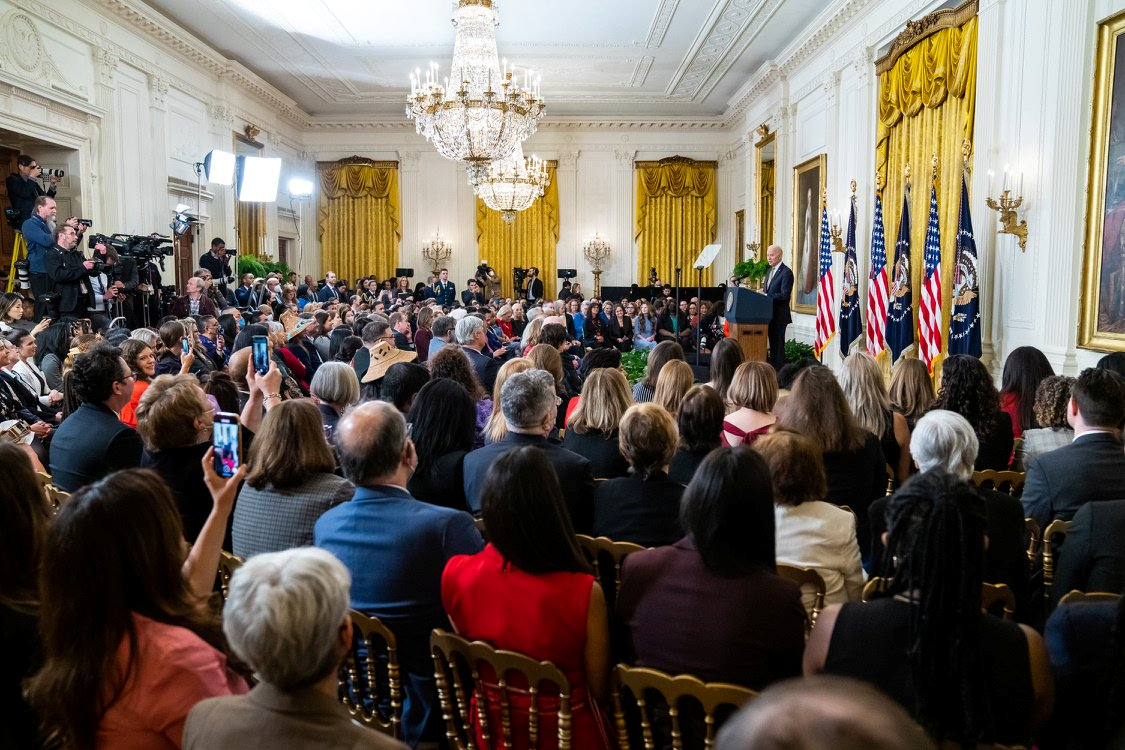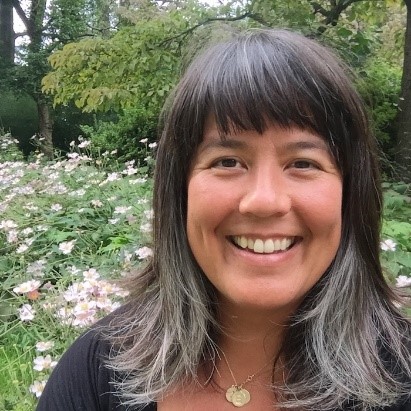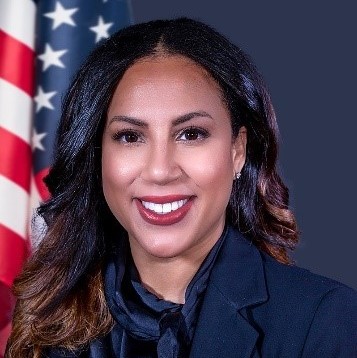Every Day as Women’s History Day: Advancing Women’s Equality in the Biden-Harris Administration
By Emma Turner (she/her)
In honor of Women’s History Month, Emma Turner, Staff Assistant for Economic Agency Personnel in the Presidential Personnel Office, spoke with Natalie Madeira Cofield, Assistant Administrator for the Office of Women’s Business Ownership at the U.S. Small Business Administration (SBA), and Wendy Chun-Hoon, Director of the Women’s Bureau at the U.S. Department of Labor.
The month of March marks Women’s History Month, a time to reflect on the immeasurable contributions and achievements of women over the years. For me, Women’s History Month is about uplifting the stories of individuals who are often left out of our history books – but it is also a time to recognize that our work towards equality is still ongoing.
The Biden-Harris Administration has a record number of women working every day to build a better America. As a young woman serving in government, I am constantly in awe of the role models surrounding me – from Vice President Kamala Harris, the first female vice president, to Secretary Janet Yellen, the first female U.S. Secretary of the Treasury. These leaders make me even more aware that the responsibility falls on us all to continue their work and set an example for the next generation of women.
Despite our progress, women still experience significant inequities in the workforce. Recently, I had the opportunity to sit down with two women at the forefront of addressing those inequities: SBA Assistant Administrator Natalie Madeira Cofield and the Department of Labor’s Director of the Women’s Bureau Wendy Chun-Hoon, both of whom lead offices whose mission centers on advancing the Administration’s goal of increasing economic opportunity for women. Natalie and Wendy spoke about their work supporting women business owners and workers, the importance of bringing diverse experiences to the Administration, and their advice for the future women hoping to fill their shoes. This interview was edited for clarity and length.

ET: You’re both leaders of offices that advance the equality and economic security of women. To begin, can you tell us more about your work, and why it’s so important to have offices that serve women, especially those who have been historically under-served?
Natalie Madeira Cofield: We’re at a very interesting juncture in history right now, where women represent the fastest growing entrepreneurial segment in the country. My office, which supports women-owned businesses, was established in 1988 with the codification of the Women’s Business Ownership Act. Before that, women needed a male co-signer to receive loans.
Why my office is important, why this needs to exist, is one – 1988 was not that long ago. Women have always been dealing with the ramifications of a lack of access to capital, to their own independence. We deserve the opportunity to pursue entrepreneurial endeavors, and we need access to markets to be taken seriously.
Two – women are resilient. There are 32 million small businesses in the nation. Twelve million of those were started by women – and that number’s only growing. We need to do more to support those women.
My office helps distribute funding to nonprofit organizations and partners; we fund nearly 70 million dollars’ worth of resources to 140 Women’s Business Centers. This year, we will have a Women’s Business Center in every state in the nation. That’s an incredible accomplishment – but it’s also 2022. I would’ve expected this to have already happened by now.
I’m really excited to celebrate the women in the Biden-Harris Administration, having seen the great work of my colleagues such as Wendy. These amazing women will take us into the next iteration of where we need to be going.
Wendy Chun-Hoon: Natalie, I love that you began with history. And you’re reminding me to mention: the Women’s Bureau is 102 years old. When it started, eight million women were in the workforce; today that number is 75 million.
We’re the only federal agency that’s mandated by Congress to focus on working women. Our mission is to maintain a laser focus on how women in the workplace are doing.
During the pandemic, we focused on the disproportionate impact on women and women of color – but frankly, the conditions that led to those bad outcomes existed way, way before COVID.
Equal Pay Day, which was March 15th this year, usually falls during Women’s History Month. The day symbolizes how women, working fulltime and year-round, have to work several months into the new year to get paid what men earned in the last year.
My office also produced a major report this year on what conditions made the pandemic’s impact so horrible for working women and women of color. Women, and women of color in particular, are concentrated in some of the lowest paying jobs in the economy – jobs that are incredibly undervalued and yet fundamental to how we function, such as health care, home care, child care, and education. These jobs were the hardest hit during the pandemic.
The cost of that concentration in undervalued jobs – that occupational segregation – was $39.3 billion for Black women in 2019. For Hispanic women, that cost was $46.7 billion. That’s why we need to keep a focus on women, especially women who have been historically marginalized.
NMC: That’s really powerful, Wendy. One of the things Wendy and I have talked about is how the wage gap has real effects on entrepreneurial endeavors – which goes to show how the work of our respective offices is connected.
Women have to pursue side hustles and second jobs to make up for that gap, and that gap reduces the disposable income women have to invest in businesses – so women are working more and not being able to invest as much. When you apply for loans, your personal capital and collateral comes into play. After years of inequity, your loans will inevitably be less than those of your male counterparts, especially if you’re a woman of color.
ET: As you both know, this March is Women’s History Month. In the words of President Biden, it’s a time to “reflect on the achievements of women and girls across the centuries” and to “recommit to the fight and help realize the deeply American vision of a more equal society.”
What does this month mean to you? How do you see your service in the Administration through the lens of Women’s History Month?
WCH: I find myself reflecting on International Women’s Day, which was March 8th. I thought about the lives of immigrant women like Theresa Malkiel, who worked in the garment industry in the early 1900s. At that time, women were, at best, paid only half of what their male counterparts were paid.
In response, Theresa led rallies and labor strikes that really organized and united women workers across the country to advocate for better working conditions, basic safety, fair wages, and equal rights.
I also think of the women who worked in the Triangle Shirtwaist Factory. I think of the fire, the doors that were locked, all those unnecessary and untimely deaths.
We have to struggle with our country’s history of pitting profits against workers. The report that my office released shows that we continue to invisibilize and undervalue the work of women and women of color.
The Women’s Bureau is really – as I said earlier – keeping a laser focus on how we can uplift women and how we can change unfair conditions. This early organizing was instrumental to getting protections for women into the Fair Labor Standards Act; Rosie the Riveter and the contributions of working women during World War II; promoting women’s rights through the President’s Commission on the Status of Women; and passing the Equal Pay Act, the Family Medical Leave Act, among other major legislation over the years.
And we’re not done yet. There’s still work to be done to win affordable and accessible paid leave, elder care, child care, access to higher paying jobs and higher wages in the jobs we’re in, and access to the types of capital that Natalie’s talking about.
Natalie, myself, our counterparts – it’s important that women of color who have experienced marginalization can bring our experiences to the job to keep fighting for and with those who are most marginalized, and for the solutions that will work for us. Ultimately, solutions that work for women of color bring greater equity for all of us.
NMC: The beauty of the work that I have the honor of doing is that Women’s History Month is every day in our office. We’re excited about the global emphasis on the value of what we do, and that the importance of our work is unquestionable and undeniable during this month. But, the real impact of that hard work is being realized every single day.
We’re excited about the big milestones that the Biden-Harris Administration has made: the largest number of women appointees in history, the most diverse Cabinet in history – and diverse socio-economically as well. With this, the administration can be a better voice for the American people.
I’m proud to be the first Black woman in this position. Black women are the fastest growing demographic of entrepreneurs in our country – it means a lot to see representation in this office in that way and support in what we’ve been able to do.
For more than 15 years, this has been my life’s body of work. I’ve been inspired by Madam C.J. Walker, the first female self-made millionaire, who made a way out of no way, who’s embodied the American dream and inspired my career. She not only made something for herself; she made something for others in doing so. Alexis Herman is also a personal idol of mine. She was a predecessor to Wendy as the 8th Director of the Women’s Bureau, later going on to head the Department of Labor.
I’m excited by Women’s History Month – I’m excited this work is what we’re always doing, with every day as Women’s History Day.
ET: As current leaders of this important work, what advice would you give to young women hoping to enter public service in the future?
WCH: Natalie, I love your story of Alexis Herman and Madam C.J. Walker. My advice relates to what you just said. It’s important that we bring ourselves and our life experiences into our roles.
I’ve learned to recognize where I come from and embrace it. I grew up very modestly in Hawaii in a very multicultural community, yet there was still a lot of internalized and structural racism present. With so many folks who are biracial in Hawaii, I didn’t feel different until I went to school on the mainland.
At some point along the way, I understood that I identified as lesbian. I went into advocacy work and really started embracing what it meant to identify as a woman and feel othered, to identify as lesbian and feel othered, to identify as a woman of color and feel othered, to put all of that together and understand how intersecting identities worked against us. We have to center our experiences when we define what good public policy looks like, so that we can understand what it means to invest with the most impact.
In shifting to a very public-oriented role, it’s especially important to bring these experiences to my work. I come from a background of activism and advocacy – my role is to fight every day, especially for those who are historically underserved. I’d say to folks, you should try to have as broad an experience as you can, embrace all of it, and bring that experience into service roles.
NMC: I love that, Wendy. Thank you for sharing your testimony and more about you. You spoke to one of the things I was going to talk about: really being yourself and serving yourself. People often forget themselves in the process of service and lose themselves; it’s easy to be swept away by the definition of yourself that comes from others.
You should strive for a firm understanding of who you are. The beauty of it is that everyone deserves to have their seat at the table and their voice heard, no matter what testimony they can share. A number of people had to hide who they were because of religion, race, economic status, sexual orientation – all of which have their own ramifications in how one can show up for others and themselves. The first act of public service is to take care of yourself. Without that, we’d be inauthentic in how we deliver ourselves and service to communities.
I also want to note that everything can be an act of public service. Whether here or there, inside or outside government, you can make change. You can always have the greater good and public in mind in whatever you’re doing. Consider your own existence as an act of service, in the way you operate in this world.
When you think of public service, you think of being elected, but I came to this position through being a social entrepreneur. My passions included building businesses and supporting women; everything I was doing was still in service of others.
Lastly, I’d say to really push yourself into spaces and places that you wouldn’t feel comfortable. If you really want to lead, if you want to truly understand others, you have to be uncomfortable to get to either of those places. You have to go out of your way to disconnect from your typical preconceptions, so you can navigate through every dynamic. You’ll succeed when you can do that while still being yourself.

Wendy Chun-Hoon serves as Director of the Women’s Bureau, at the U.S. Department of Labor. She has held senior positions in Maryland state government and private philanthropy, overseeing initiatives for worker and family economic justice. Born and raised in Hawaii, Chun-Hoon graduated from Vassar College before earning master’s degrees in Philanthropic Studies and Nonprofit Management from Indiana University. Chun-Hoon lives with her wife and their two kids in Silver Spring, MD.

Natalie Madeira Cofield serves as Assistant Administrator for the Office of Women’s Business Ownership, at the U.S. Small Business Administration. In this role, Cofield serves as a senior executive providing executive oversight, management, leadership, and championship of female entrepreneurship. Most recently, she served as Founder & CEO of a foundation, providing entrepreneurship programming to support thousands of multicultural women entrepreneurs. She is a graduate of Howard University where she received her BBA in Information Systems and the Baruch School of Public Affairs where she was a National Urban Fellow.

Emma Turner currently serves as Staff Assistant for Economic Agency Personnel in the Presidential Personnel Office. Emma has also worked for Senator Doug Jones from her home state of Alabama. She graduated from Georgetown University with a degree in Government.

